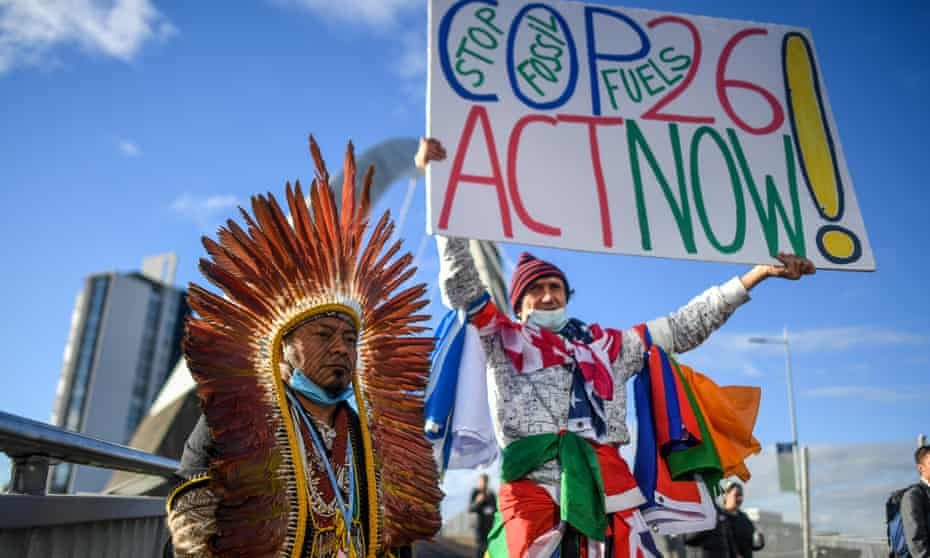At Cop26, I’ve found I have more in common with protesters than politicians
Like the activists I believe in action, not words. Global leaders mouth good intentions, but they are woefully insufficient

Say what you like about how dismally difficult it is to get a ticket, but “global Britain” still knows how to put on a show. Cop26 has now finished its first act – the world leaders’ summit – starring more than 120 heads of state, thousands of their aides and hangers-on, and the city of Glasgow.
I’m one of the hundreds from the British civil service working with the UN to stage-manage by far the most ambitious summit in either’s history. There was no shortage of volunteers – thousands of us applied, and for all the reasons you’d expect: idealism, ambition and simply to be present at a critical moment in modern world history.
The world leaders’ summit was a two-day blizzard of high-level speeches, bilaterals, “family photos” and declarations. The basic idea? That an outpouring of presidential pageantry at the start of Cop26 provides political sustenance for the far trickier 10 days of negotiations ahead.
We’ll see: I’m not a negotiator. But I can tell you what it feels like to be at the heart of the storm.
The sheer scale of Cop26 impresses, long before you step inside; the police presence, the protesters, and the myriad cordons, diversions and temporary structures are all visible for miles around. Less impressive are the daily queueing and access problems generated by security and Covid apparatus struggling to cope with numbers some Premier League clubs would bite your arm off for.
But once you’re in, there’s lots to see. Especially for lucky backstage grunts like us, who can access the two behemoth restricted plenary spaces (named Cairn Gorm and Pen Y Fan, after the mountains), as well as the maze of the pavilion, where gimlet-eyed government and NGO reps lure in delegates with Ted-style talks, free food and sustainably made merchandise. Behold too the giant globe beneath which every self-respecting delegate flocks to get that vital selfie.
This isn’t a natural habitat for civil servants, unused as we are to the commercial whiff of fresh paint, glue and chipboard that emanates from the newly finished exhibition space, or to the acres of Cop26 “partner” branding that festoons every inch of wall space. You’re never more than 10 metres from armed UN security guards, though they never seem to lift a finger to prevent unwary delegates being barged by phalanxes of journalists and photographers stalking a celebrity or “marquee” politician through the main drag.
There’s a distinct airport vibe, including in the uber-VIP world leaders’ lounge, whose soft furnishings and ethereal beings I caught a glimpse of between the praetorian guards who prowl its interior. UN officials are reportedly bemoaning a “business-class mentality” among delegates. Such a contrast with what’s going on outside – the protesters, bin collection strikes and travel disruptions, and the “large, naked Scottish man” who flashed Joe Biden.
As a whole, the Cop process seems, according to civil society groups, to have become even more exclusive – and Covid restrictions don’t explain this. I saw it myself walking through the plenary zones, and Monday’s VIP reception photo demonstrates the shameful and persistent absence from the main leadership rostrum of women, people with disabilities and the young who – most of all – will face the consequences of the magical thinking that all homogenised elite groups seem to specialise in.
Speaking of which, do civil servants working at Cop26 share the “cautious optimism” touted by Britain’s prime minister? My guess is no, we don’t. Some are veterans of previous Cop events, G7s and other diplomatic conclaves, but almost all of us carry scars from Covid and Brexit which remind us that, while good intentions are necessary, they are also woefully insufficient.
Is “optimism” even an appropriate response to the climate emergency? It may be the closest thing to genuine hope that our showman prime minister is capable of mustering, but it’s not enough, as his speech at the Cop26 opening ceremony amply demonstrated. I listened to it in the company of some youthful delegates from several continents – their reaction to Boris Johnson’s remarks was one of muted, fascinated disgust.
Civil servants, like the public, prefer urgent action to fatuous words. After all, we’re the ones who’ll wrestle with the implementation of climate action plans, financing and legislation, long after the politicians have scuttled off into gilded obscurity.
This is what we share with the activists and the protesters outside Cop26: an instinctive understanding of what real change requires, and an acceptance of the inescapable fact that keeping the planet within anything like 2C of warming means leaving fossil fuels in the ground.
All else is theatre – which is why, on Saturday, many of us will be joining the global day of action.
-
The civil servant is a serving member of the UK civil service
